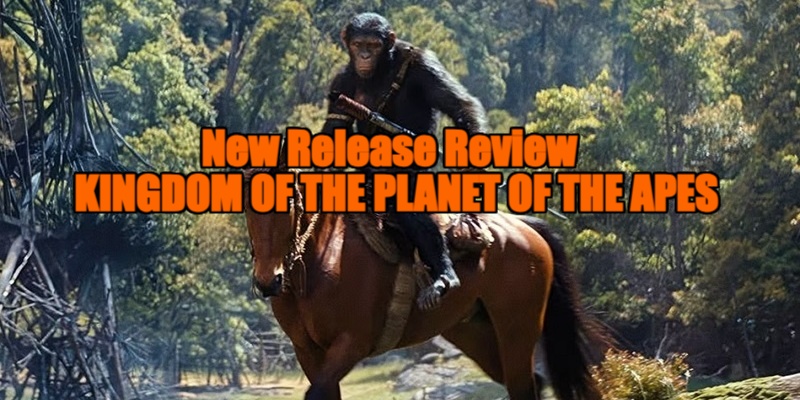
Review by
Eric Hillis
Directed by: Wes Ball
Starring: Owen Teague, Freya Allan, Peter Macon, Eka Darville, Kevin Durand, William H. Macy, Dichen
Lachman
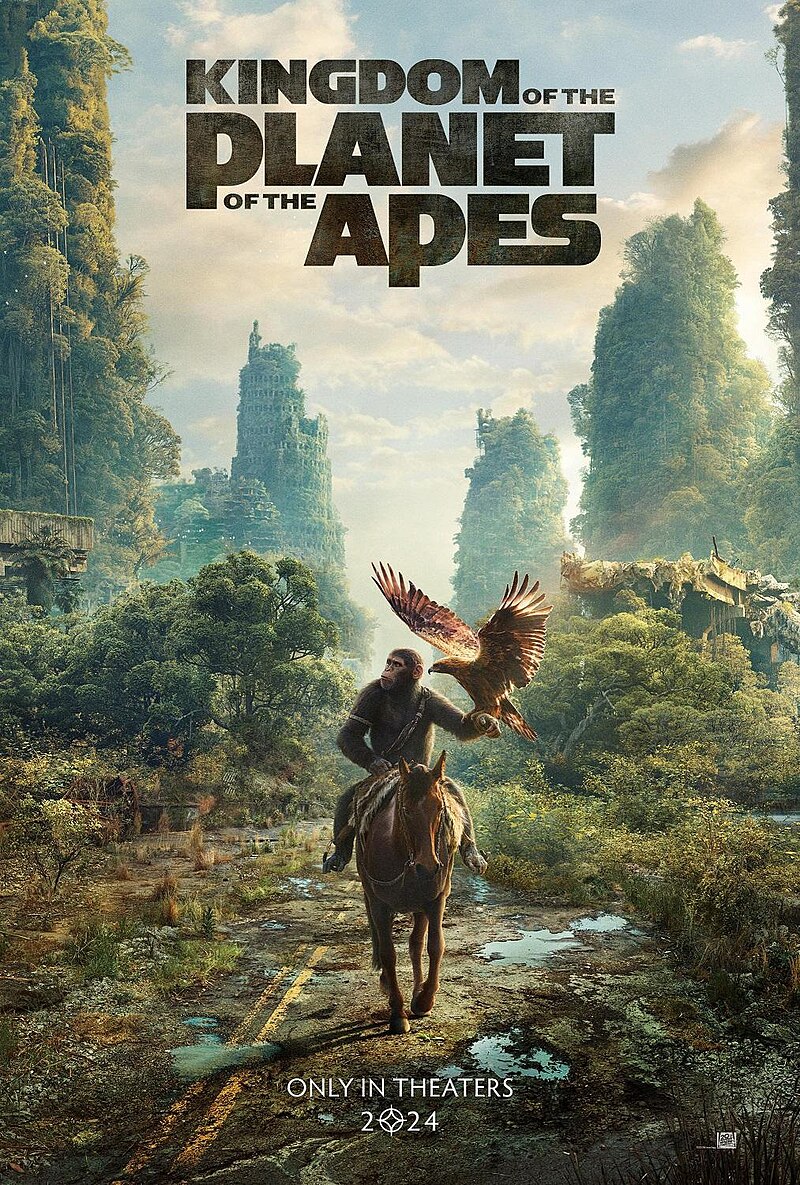
The recent Planet of the Apes trilogy of Rise, Dawn and War constitute the most successful of the many reboots Hollywood
has foisted on cinemagoers over the past decade (though Creed is a close second). Unlike the worst reboots, like the
recent The Fall Guy, the trilogy didn't cynically hijack brand recognition, rather it
delivered a fresh take while giving fans of the original 1970s
series exactly what they wanted from the franchise's return. As a
lifelong admirer of the 1968 film and its under-rated sequels (okay,
maybe not Battle), and having been scarred by Tim Burton's misguided remake, I was
apprehensive, but ultimately I liked what I found in the new
trilogy.
Adding a fourth instalment to what is a perfectly good trilogy
seemed a risky move, but director Wes Ball's Kingdom of the Planet of the Apes is less of a fourth chapter and more the first movie in a new
trilogy, one that seems headed for a tie-in with the original 1968
film.
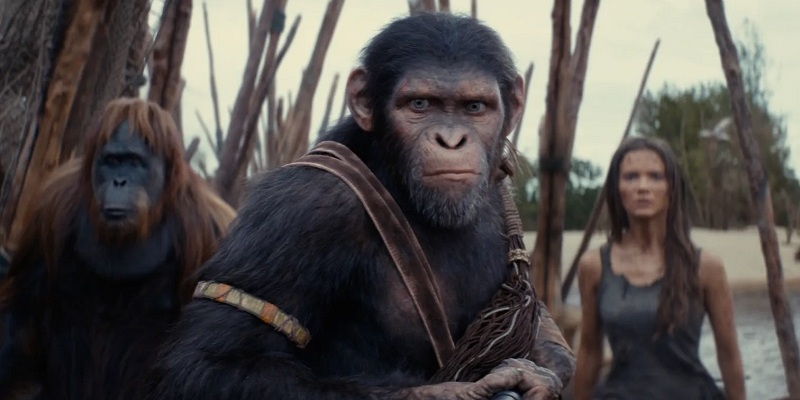
Set "many generations" after the events of War, Kingdom introduces us to a world that somewhat resembles the one on
which Charlton Heston crash lands. The long term effects of the
virus introduced in Rise has rendered humans mute, and they've reverted to a savage
state, hunted by apes on horseback who work for Proximus Caesar (Kevin Durand), a gorilla tyrant obsessed with continuing the legacy of Caesar,
the ape who started all this and who was the focus of the previous
three films. In a blackly comic twist, Proximus has confused the ape
Caesar with his human counterpart from ancient Rome and so
mistakenly believes that Caesar was a tyrannical ruler. It's a
cheesy idea in the vein of "Wait, your mom's name is Martha too?"
but it works nonetheless.
Not all apes are malicious however. In keeping with the established
lore, chimpanzees are peace-loving and orang-utans are
intellectuals. Our protagonist, Noa (Owen Teague), is a young
chimpanzee who is part of a clan that have devoted themselves to
raising eagles. A trip to steal an eagle's egg from a nest leads Noa
to come across a marauding platoon of Proximus's gorillas, who burn
his village to the ground and abduct its inhabitants. On a quest to
find and free his people, Noa is joined by Raka (Peter Macon), a wise old orang-utan, and Mae (Freya Allan), a young
human girl who insists on following Noa like a lost puppy and is
given the designation "Nova" by her ape companions.
If you're a fan of this series you'll likely find Kingdom a compelling new chapter/fresh start as it's highly invested
in its "world building". That's become a loaded phrase thanks to so
many franchise starters that invest time in setting up subsequent
movies that either never get made or decide to take different
routes. But we suspect we're in safe and steady hands here, that we
will indeed get a payoff to all this further down the line. Time
will tell of course. With Disney now in charge there's always the
worry that we get a repeat of the constant "course correction" of
the recent Star Wars sequels.
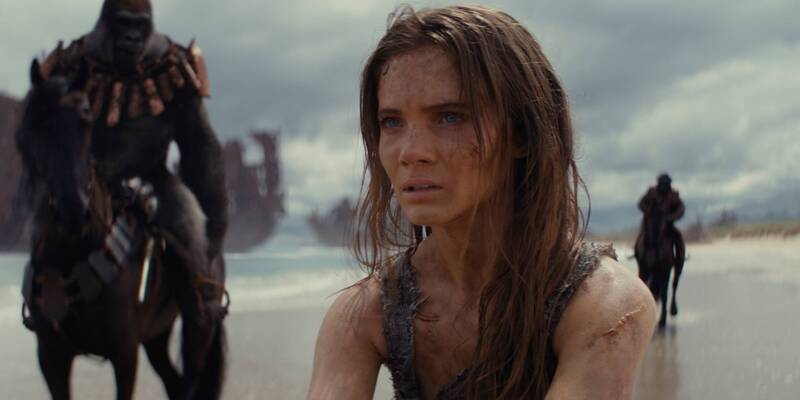
As a standalone movie however I'm not sure if Kingdom holds enough wide appeal to draw in a new audience beyond
those of us who are already invested. At close to two and a half
hours it never lags, yet it's somewhat uneventful and lacks any
defining set-pieces. Modern effects aside, it has more in common
with the '70s sequels than the recent trilogy, with composer John
Paesano aping (sorry) Jerry Goldsmith's original score in parts.
It's more focussed on characters and tying its lore in a neat bail
than in delivering spectacle, which I appreciated as a fan of the
old movies but I suspect may not go down so well with the average
impatient modern cinemagoer.
In Noa and Mae we get two of the most compelling characters to
grace the franchise. Noa is an innocent who becomes exposed to the
truth his elders have protected him from, and his reaction to
uncovering a world that holds the promise of either a utopian or
dystopian future is the film's anchor. Through the figure of Mae the
film returns to the franchise's ongoing wrestling bout with its
shifting allegiances. Should we root for Mae because she's a human
like us, or does her cherubic face represent a doomed future for the
apes we've fallen for? No clear answers are given in a movie that
refuses to sermonise. What's great about all the incarnations of
this franchise is that there are no heroes or villains; those are
simply labels that are swapped film to film as humans and simians
strive for dominance and survival.
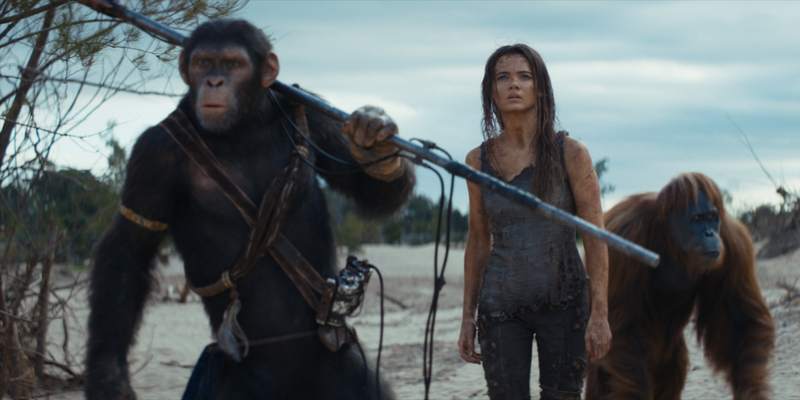
Teague delivers arguably the best ape performance since Roddy
McDowall and Kim Hunter's captivating double act. We see a new
uncertain dawn reflected in his initially bright but increasingly
sad eyes, and it's remarkable how he manages to "humanise" a
character without the advantage of a human face. The ape effects
were already highly impressive in the previous films but they've
evolved to another level here. Scenes in which apes trash about in
water are on a par with the recent Avatar sequel, fur and liquid being two things CG has long struggled with.
If it doesn't quite offer enough originality in its storytelling to
make for a great standalone entry, Kingdom fills its obligations as a new trilogy kickstarter, laying
the foundation for an exciting new round of the ongoing conflict
between man and ape. Even those who are unconvinced by this chapter
will be pumped for the potential its ending sets up.
Kingdom of the Planet of the Apes is
in UK/ROI cinemas from May 9th.


